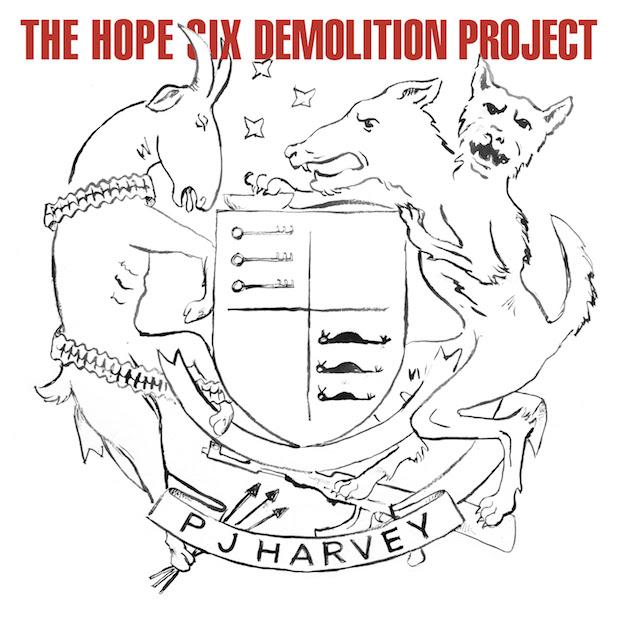PJ Harvey’s back catalogue is a sight to behold. Over eight solo records, the woman hasn’t even skimmed the surface of a bad record. She’s toyed with a multitude of genres from Albini noise to electronica to English folk and fit into each with alarming ease. Yet in spite of her mercurial ability, she still finds a way to challenge her listeners, even this late in the game. Her previous album, Let England Shake, was a concept album the first world war as viewed through English folk music. Her latest LP, The Hope Six Demolition Project, is a vicious polemic about blind eye the west is turning to rampant poverty and horrors around the world, inspired by her journeys to Kosovo, Afghanistan and Washington D.C. A righteous fury and indignation fuel the majority of the record’s forays into a near-apocalyptic viewpoint, which while angry and unflinching, never forget the human element at the core. It’s no small task and while there are points where Harvey shines brighter than she has since Songs From The City, there are more than a few elements that stop the record from achieving its full potential.
This overbearing sense of foreboding and doom colours every moment of Hope Six. This is an album about the dispossessed, the disappeared and our own inability to cope with such a widespread chaos and disrepair. ‘The Ministry of Defence’ is driven by this noisy stop-start riff that grabs you by the scruff of the neck and commands your attention while the lyrics recount a tale of a shelled out husk of civilisation, while ‘A Line In The Sand’ tackles the difficulty inherent in retaining an optimistic outlook as families feast on cold horse hooves and kill for the first drops of water. It’s sobering experience that makes the record at times quite tough, yet completely compelling. Musically, the rough edges of the songs are prominently on display. Horns wail, vocals distort and the sound is muddy yet perfectly polished; it’s a hi-fi lo-fi album. Combined with a fantastic use of group vocals and there is a sensibility that lends the record this feeling of being the end times broadcast of the last bar band in the world.
It’s an album that begins and ends with its strongest songs. ‘The Community of Hope’ is one of the best songs Springsteen never wrote. Hearing Harvey interpret the E Street band in her own distinctly English way is intrinsically fascinating and the lyrics that accompany are faultless. In two minutes, she creates a vision of a city entirely devoid of salvation where zombified addicts are a part of the daily grind and the most exciting thing to happen is that a Walmart is coming to town, supposedly. Putting this as the opener is a mixed blessing, though, as it sets a bar that album struggles to reach for the majority of its duration. In fact, it is only in the impeccable climactic one-two punch that the feat is achieved. Lead single, ‘The Wheel’, has the best chorus about missing children you’re likely to hear. The song melds the abduction of children with the disappeared of Kosovo’s cleansing in a respectful, yet incredibly catchy and accessible manner. It’s a real spellbinding track, but it simply sets the stage for the album’s real masterpiece: ‘Dollar, Dollar’. Essentially a song about Harvey seeing a child begging for money on an Afghan road, the song ranks as one of the best song’s she has ever written. Everything about the song works from its gospel vocals and gentle swelling synths to the use of ambient traffic sounds, which sets the mood flawlessly. The lyrics are a haunting confession about the futility of using words as a solution, Harvey’s own inability to help anyone and the realisation that nothing will ever change. It’s a true showstopper and her decision to leave it to the end of the record was a wise one.
While large segments of Hope Six are incredible, it is a record that does leave the listener wanting more. While no song is bad per se, there is still this feeling that more could be extracted from them as is the case on ‘Orange Monkey’, ‘Medicinals’, and ‘The Ministry of Social Affairs’. Placing these songs in succession, unfortunately, mean that ‘The Wheel’ has a much harder job as it has reignited the spark for the album so late in the game. In many ways, it is a record not dissimilar to Radiohead’s King of Limbs. Both are later albums by artists oft considered to be the best of their generation and both have a huge amount of potential that they never fully realise. Now, in this case, Hope Six is an objectively better record than King of Limbs and is still an excellent album. But there is constant niggling feeling that everything could be that little bit better with just a little more time in incubation. Will Murphy






